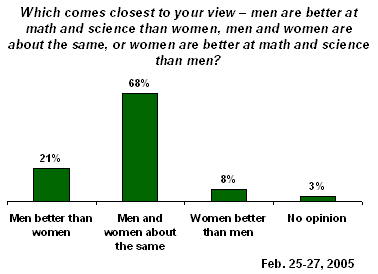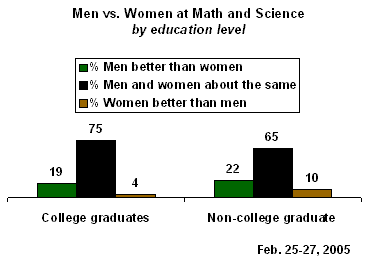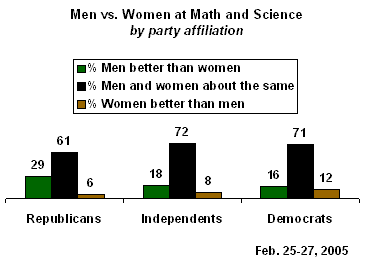GALLUP NEWS SERVICE
PRINCETON, NJ -- Harvard University President Lawrence Summers sparked a controversy with his widely reported comments in January on why there are fewer women than men in math and science professions. He raised the possibility that biological differences or differences in personal choices between men and women could be more important than either early socialization or some form of gender discrimination. Debate soon ensued as to whether men really are better than women at math and science, and if so, the reasons why.
A recent CNN/USA Today/Gallup poll found that a significant majority of Americans disagree with the assumption that men are better than women at math and science, saying the two genders are about the same in this regard. However, about one in five Americans are willing to say that men are superior to women in math and science, although this group is divided as to whether that is due more to innate differences or more to societal influences.
Gender Differences in Math and Science
The Feb. 25-27 poll finds 68% of Americans saying men and women are about the same when it comes to their math and science abilities. Slightly more than one-fifth of Americans, 21%, believe men are superior in these areas, while 8% think women are superior.

Majorities in all key demographic subgroups of the population believe that parity exists between the genders in terms of their math and science abilities. Perhaps most importantly, the data show that men and women have nearly identical views -- most members of both groups say the genders are equal, and similar proportions of men and women who perceive differences say men are better. Sixty-eight percent of men believe the genders are equal, 19% say men are better, and 9% say women are better, while 68% of women believe abilities are equal, 23% say men are better, and 8% believe women are better.
Some opinion differences are apparent by education and political views.
College graduates (75%) are more likely than non-college graduates (65%) to believe the genders are equal in their math and science abilities. Non-college graduates believe men are better than women by a 22% to 10% margin, while among college graduates the margin is slightly larger -- 19% say men are better and 4% women.

Democrats (71%) and independents (72%) are more likely than Republicans (61%) to believe the genders have comparable abilities in math and science. Republicans are nearly five times more likely to say men are better (29%) than to say women are better (6%), while Democrats are about as likely to say men are better (16%) as to say women are better (12%). Independents fall in between, with 18% saying men are better and 8% women.

Why the Difference?
If either gender is in fact better than the other at math and science, the reasons are probably numerous and difficult to pinpoint. The poll asked those respondents who believe men are better at math and science to choose among two possible explanations -- one focusing on biological differences (or "nature") and the other on societal and cultural differences (or "nurture"). Equal percentages of those who believe men have an advantage say it is due to "differences between boys and girls that are present at birth" as say the perceived advantage is due to "differences in the way society and the educational system treat boys and girls."
Just your best guess, is that due more to -- [ROTATED: differences between boys and girls that are present at birth, (or more to) differences in the way society and the educational system treat boys and girls]?
|
Differences |
Way society/ |
No |
|
|
|
|
|
|
|
2005 Feb 25-27 |
48% |
48 |
4 |
Survey Methods
These results are based on telephone interviews with a randomly selected national sample of 1,008 adults, aged 18 and older, conducted Feb. 25-27, 2005. For results based on this sample, one can say with 95% confidence that the maximum error attributable to sampling and other random effects is ±3 percentage points. In addition to sampling error, question wording and practical difficulties in conducting surveys can introduce error or bias into the findings of public opinion polls.
19. Which comes closest to your view -- [ROTATED: men are better at math and science than women, men and women are about the same, or women are better at math and science than men]?
|
Men |
Men and women |
Women |
|
|
|
|
|
|
|
|
|
2005 Feb 25-27 |
21% |
68 |
8 |
3 |
20. Just your best guess, is that due more to -- [ROTATED: differences between boys and girls that are present at birth, (or more to) differences in the way society and the educational system treat boys and girls]?
|
2005 |
||
|
% |
||
|
Men better at math/science than women |
21 |
|
|
(Due to differences present at birth) |
(10) |
|
|
(Due to differences in way treat boys/girls) |
(10) |
|
|
(Unsure) |
(1) |
|
|
|
||
|
Men and women about the same |
68 |
|
|
|
||
|
Women better at math/science than men |
8 |
|
|
|
||
|
No opinion |
3 |
|